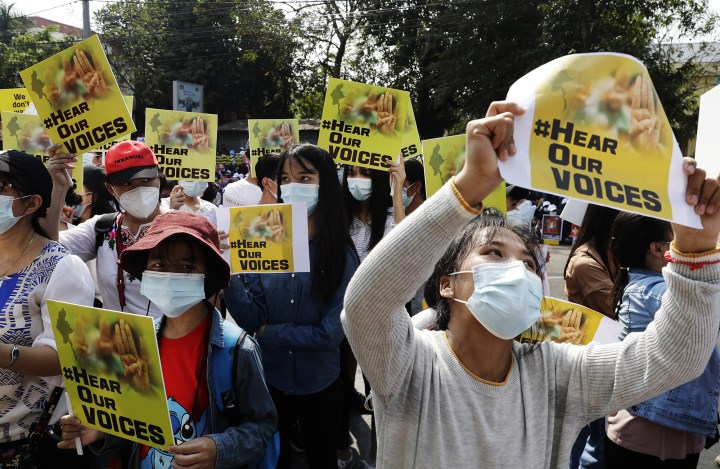DM168 International
Exiled Burmese journalist: Military chief ‘wants to be a monarch’

Myanmar’s military leaders wouldn’t settle for less than absolute power and privilege. Strikes won’t work, but drone strikes on key targets might, says exiled Burmese journalist Swe Win, speaking from a secret location in exile
First published in the Daily Maverick 168 weekly newspaper.
The military enjoyed ultimate power in Myanmar anyway, despite the figure of Nobel peace laureate Aung San Suu Kyi as State Counsellor, ostensibly at the head of government. So why did the generals feel the need to launch a coup on 1 February, toppling her National League for Democracy (NLD) government and placing her under house arrest?
It was because they wanted absolute power – in effect, “monarchy”. And because they craved the privileges, including unfettered business opportunities, that they had lost under the power-sharing arrangement with Aung San Suu Kyi. And because they were encouraged to do so by the military’s chief foreign ally, China, which feared it was losing influence in Myanmar.
So says beleaguered Burmese journalist Swe Win, speaking from a secret location in exile.
General Min Aung Hlaing led the coup. It followed the November 202o elections in which the NLD crushed the military’s political party in a landslide.
“The military had all the control and power,” even before the coup, Swe Win told DM168 in a phone interview this week.
“This was a military-guided transition, a military-designed democracy. … They had a lot of power. But they saw that they [had] lost some of their special privileges they [had] enjoyed back in the military rule. They wanted to restore all these privileges.
“There’d been a lot of criticism about what the military had been doing … The military wanted to suppress all these things.” That included laws which the Aung San Suu Kyi government had introduced that protected people from arbitrary arrests by the military.
An even bigger factor was China, which he believes encouraged the junta to restore the military dictatorship. “China has a lot of influence over the military. They have a lot of projects between military-owned companies and Chinese state-owned companies.”
These big projects – including a Chinese-owned $6-billion hydropower project in the north of the country – were blocked due to public opposition. Since the coup, the coup leader has announced that he would restore hydropower projects.
China also feared the growing surge of democracy in Myanmar was hurting its geopolitical interests in this region.
If Myanmar became genuinely democratic, not only China but also Russia would have lost Myanmar as one of their geopolitical allies in the region, Swe Win said.
Myanmar’s military also launched the coup to regain the unfettered control of its business interests. “The military junta grabbed land, stole state-owned factories. They stole all these key state assets in a process called privatisation.”
Under junta rule, the companies had enjoyed a lot of privileges, for example, not having to pay tax. After the Aung San Suu Kyi government came into power, they lost some of these privileges.
And General Hlaing had also launched the coup because he “wants to be monarch … wants to be an absolute military dictator”.
Swe Win is not optimistic about the chances of peaceful protests and foreign sanctions forcing Hlaing to restore power to the Aung San Suu Kyi government.
Protesters have been on the streets almost every day since the coup and many workers, including civil servants, are staying away from work. It seems to be expanding and possibly threatening to derail the economy.
Could that not persuade the junta to back down? Swe Win fears not. He recalled that in 1988 after Myanmar’s second military coup, not only the civil service but even army officers, including almost the entire air force, took to the streets in protest against the military rule. “Even so, all these nationwide strikes and protests were crushed by the military. This year, we don’t have any division within the military over the coup. They’re working together to consolidate their control. So it’s quite difficult to be optimistic.”
Foreign governments should try to help. South Africa, for example should attempt to use its influence on China and Russia through its membership of BRICS to exert pressure on the junta. It should also expel any junta family members who may be in SA.
Yet in the end, he does not believe foreign sanctions and pressure will force the military to back down either.
“What the US can do is launch targeted drone attacks on some of the key leaders of the regime,” he added, rather nonchalantly.
Is he proposing this? No, but it’s what the Burmese public wanted, he said. “The public wants some sort of military intervention from the Western powers.”
And, whether or not he himself is proposing it, targeted military intervention was the only thing that would bring regime change, he said.
The coup, depressingly, marked the failure of power-sharing as a transitional mechanism towards democracy. Swe Win partly faults the Aung San Suu Kyi government. He said it went to extreme lengths to preserve its fragile relationship with the military.
But in the end, bending over backwards to appease the generals proved not to be enough anyway. DM168
This story first appeared in our weekly Daily Maverick 168 newspaper which is available for free to Pick n Pay Smart Shoppers at these Pick n Pay stores.


















 Become an Insider
Become an Insider
Comments - Please login in order to comment.